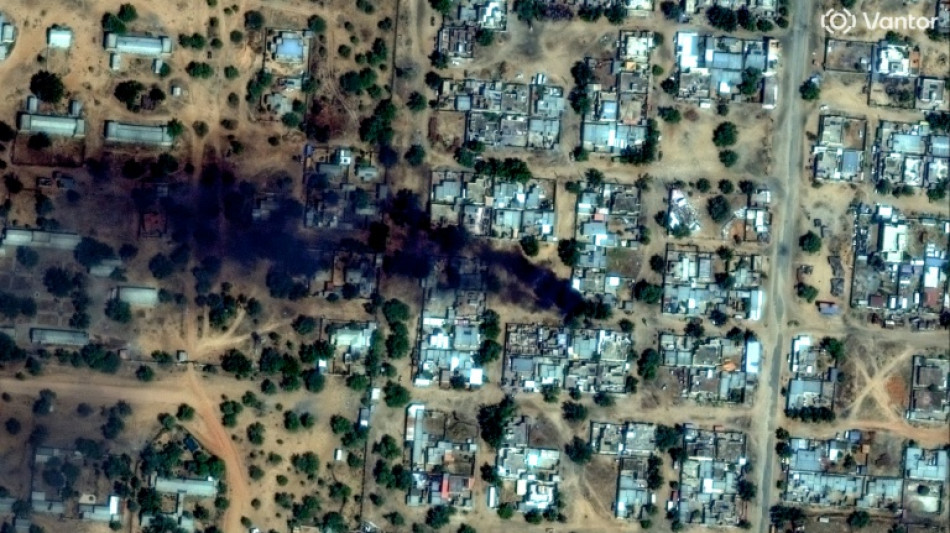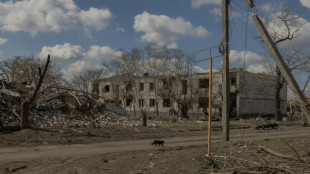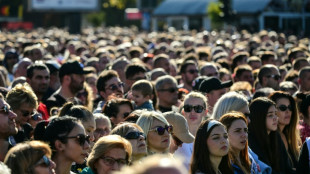

Families separated, children killed as survivors flee Sudan's 'apocalyptic' El-Fasher
Survivors fleeing the Sudanese city of El-Fasher told AFP on Saturday that paramilitary fighters separated families and killed children in front of their parents, with tens of thousands still trapped following the city's fall.
Germany's top diplomat Johann Wadephul described on Saturday the situation in Sudan as "apocalyptic" while fresh satellite images suggested mass killings were likely ongoing, five days after the paramilitary Rapid Support Forces seized El-Fasher.
At war with the regular army since April 2023, the RSF pushed the military out of its last stronghold in the vast Darfur region after a grinding 18-month siege.
Since the takeover, reports have emerged of summary executions, sexual violence, attacks on aid workers, looting and abductions, while communications remain largely cut off.
"I don't know if my son Mohamed is dead or alive. They took all the boys," Zahra, a mother of six who fled El-Fasher to the nearby town of Tawila, told AFP in a satellite phone interview.
Before reaching the nearby RSF-controlled town of Garni, she said RSF fighters stopped them and took her sons, aged 16 and 20. "I begged them to let them go," she said, but the fighters only released her 16-year-old son.
Another survivor, Adam, said two of his sons, aged 17 and 21, were killed in front of him.
"They told them they had been fighting (for the army), and then they beat me on my back with a stick," he told AFP.
In Garni, RSF fighters saw the blood of Adam's sons on his clothes and accused him of being a fighter. After hours of investigations, they let him go.
The survivors' full names have been withheld for their safety.
The UN says more than 65,000 people have fled El-Fasher since Sunday but tens of thousands remain trapped. Around 260,000 people were in the city before the RSF's final assault.
"Large numbers of people remain in grave danger and are being prevented by the Rapid Support Forces and its allies from reaching safer areas," Doctors Without Borders (MSF) said.
The group said that only 5,000 people had managed to make their way to Tawila, about 70 kilometres to the west.
The numbers of people arriving in Tawila "don't add up, while accounts of large-scale atrocities are mounting", MSF's head of emergencies Michel Olivier Lacharite said.
- 'Mass killing is continuing' -
Several eyewitnesses told MSF that a group of 500 civilians, along with soldiers from the military and the army-allied Joint Forces, had attempted to flee on Sunday, but most were killed or captured by the RSF and their allies.
Survivors reported that people were separated based on their gender, age or presumed ethnicity, and that many were still being held for ransom.
Darfur is home to a number of non-Arab ethnic groups, who make up a majority of the region's population, in contrast to Sudan's dominant Sudanese Arabs.
Hayat, a mother of five who fled the city, previously told AFP that "young men travelling with us were stopped" along the way by paramilitaries and "we don't know what happened to them".
The UN said on Friday the death toll from the RSF's assault on the city may be in the hundreds, while army allies accused the paramilitary group of killing over 2,000 civilians.
Yale University's Humanitarian Research Lab suggested on Friday that mass killings were likely continuing in and around El-Fasher.
The lab, which uses satellite imagery and open-source information to document human rights abuses during wars, said fresh images from Friday showed "no large-scale movement" of civilians fleeing the city, giving them reason to believe much of the population may be "dead, captured, or in hiding".
The lab identified at least 31 clusters of objects consistent with human bodies between Sunday and Friday, across neighbourhoods, university grounds and military sites.
"Indicators that mass killing is continuing are clearly visible," the lab said.
- 'Truly horrifying' -
At a conference in Bahrain on Saturday, Wadephul said Sudan was "absolutely an apocalyptic situation, the greatest humanitarian crisis of the world".
The RSF said on Thursday that it had arrested several fighters accused of abuses during the capture of El-Fasher, but UN humanitarian chief Tom Fletcher questioned the group's commitment to investigating atrocities.
Both the RSF -- descended from the Janjaweed militias accused of genocide in Darfur two decades ago -- and the army have faced war crimes accusations over the course of the conflict.
The US has previously determined that the has RSF committed genocide in Darfur.
The RSF has received weapons and drones from the UAE, according to UN reports.
An Emirati official in a statement on Saturday said, "we categorically reject any claims of providing any form of support to either warring party... and condemn atrocities".
Meanwhile, the army has drawn on support from Egypt, Saudi Arabia, Iran and Turkey.
El-Fasher's capture gives the RSF full control over all five state capitals in Darfur, effectively splitting Sudan along an east-west axis, with the army controlling the north, east and centre.
UN officials have warned that the violence is now spreading to the neighbouring Kordofan region, with reports emerging of "large-scale atrocities perpetrated" by the RSF.
The wider conflict has killed tens of thousands, displaced nearly 12 million and created the world's largest displacement and hunger crises.
U.Berger--BP



